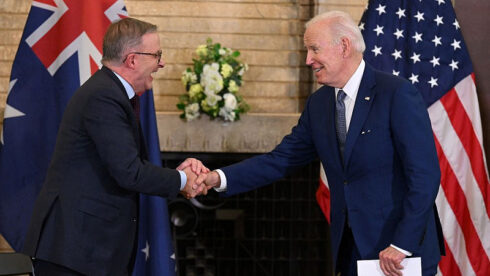Fears Of Abandonment: Australia, Biden And Cancelling The Quad Visit
Written by Dr. Binoy Kampmark.
Much needless fuss has been generated by President Joe Biden’s cancellation of his visit to Australia for the Quad meeting, a now regular gathering of leaders from the US, Japan, India and Australia. He had other things on his mind: dealing with fractious debt ceiling negotiations taking place back in the United States.
Students of US history would, or should have appreciated, the two phenomena that speckle the fiscal landscape in Washington. One is the failure of Congress to pass a budget in a timely, mature fashion. Then comes that plague known as the federal debt ceiling.
Since 1976, 22 federal government shutdowns have taken place because of budgetary tardiness. The results, while affecting employment and the economy, are always seen as minor relative to any failures to lift the debt ceiling. The latter comes with paralysis, the literal shutting down of government, leaving many services undelivered, and staff furloughed and unpaid.
Raymond Scheppach, a public policy academic based at the University of Virginia, is even unsparingly hyperbolic on the consequences of hitting the ceiling.
“It could bring down the entire financial system. This in turn could devastate the world gross domestic product and create mass unemployment.”
Such is the wisdom of having a global system so heavily concentrated in the hands of one power and its corporate auxiliaries.
Those most upset were the security propagandists in Australia, straining in their efforts to detect any smoke signals from Beijing. Would these suggest glee and delight, perhaps some gloating that Washington was neglecting the Indo-Pacific in favour of domestic squabbles? Internal fiscal chaos might also be a sign of decline, prompting the mandarins of the Middle Kingdom to rejoice.
The sentiment was odd, even childish, typical of the abandonment complex that percolates through the Australian political establishment. “Notice me, please, Daddy” seems to be their governing consideration, and not doing so induces a state of anxiety verging on the pathological. James Curran identifies that “instinctive zero-sum mentality” typical of this confected “new cold war”, one that leads to tenuous conclusions:
a Joe Biden “no-show was deemed a ‘win’ for China, a blow to America’s standing in Asia, a marker of US decline and a humiliating snub to [Australian Prime Minister] Anthony Albanese.”
For fans and well-wishers for a decline, if not retreat, of sprawling US global power, the only answer would be: If only.
A sprinkling of examples will suffice. Veteran journalist-cum-academic Mark Kenny wondered if the US commitment, not merely to the forum, but to the region, might be called into question. With a paucity of reasoning, Kenny suggested on the ABC News channel that Biden’s change of heart had been “a bit of a win for Beijing”, showing a failure on the part of the US to “counterbalance” the wicked Red-Yellow menace, which, for good measure, remains Australia’s largest trading partner.
Cameron Stewart, chief international correspondent at The Australian, abandoned all pretence to investigative reporting in expressing unalloyed frustration at Biden’s decision. Again, the Red-Yellow menace featured prominently, and aggressively.
“It will be celebrated in Beijing because it robs Australia of a historical opportunity to send a clear message to China about the commitment of the key Indo-Pacific democracies to stand up to its military adventurism and economic coercion.”
Attitudes were not much different at the supposedly centre-left outlet, Guardian Australia. “Chinese state media outlets won’t need to muster much creative energy to weave together some of Beijing’s preferred narratives: that the US is racked by increasingly severe domestic upheaval and is an unreliable partner, quick to leave allies high and dry.”
In a feat of flabby journalism, bloated by speculation, previous presidential cancellations for reasons related to debt ceiling and budgetary crises were omitted. (Remember President Bill Clinton’s cancelled trip to Japan in 1995?) Research in these subterranean depts of writing remains proudly absent.
Then came the disingenuous shift of focus to another party, one who really ought to be aggrieved by the Biden cancellation. Conveniently, it happened to be Papua New Guinea, whose own relationship with Australia as imperial outpost, policed province, and donor recipient, has never been entirely reconciled. The bellicose and perennially war-loving Peter Jennings, formerly executive director of the US-funded Australian Strategic Policy Institute (ASPI), sighed that, “Washington was close to signing a defence co-operation agreement with PNG that would increase US military visits, exercises, fuel storage and logistic support.”
The Australian also claimed that it would be “felt heavily in PNG, where the impoverished Marape government had spent millions preparing for the presidential visit, and was preparing to sign a wide-arranging security agreement with the US President.” And so did PNG become the convenient surrogate for Australian fears of being ignored and shunned.
The paper also went on to describe the logistics of the planned visit, making it sound more like a carefree tourist jaunt of pop-in recreationists rather than a serious meeting of statesmen. Biden, it was reported, was to use a US C-17 Globemaster. He was to arrive at Sydney Airport “to deliver the President’s helicopter, Marine One.” The helicopter would have then been used “to travel between Sydney, where the President and his 1000-plus entourage were to stay, and Canberra, where he was due to address both houses of parliament.” Such wonderful details.
The gurgling infantilism of the reaction needlessly elevated the importance of a meeting that would have somehow mattered one way or the other. For one thing, the Quad forum is an opportunity for chit-chat that does little to change the background of the relationships. Between Australia and the United States, as the newly appointed Australian ambassador to Washington, Kevin Rudd, told NPR, “The relationship between the two of us is as robust and as intense as I’ve ever seen it.”
This is appropriately revealing. Supine, unquestioning, and moving between the statuses of vassal and satellite, Canberra sees its military outsourced, governed and policed by Washington, its strategic and operational goals dictated by the Pentagon, its relevance as a Pacific outpost measured only by its utility in defending US interests. Its role in any future war in the region alongside the United States, however foolish and bloody, is assured. What matters, however, is that the one pushing the trigger of intervention will not be an Australian.
Dr. Binoy Kampmark was a Commonwealth Scholar at Selwyn College, Cambridge. He currently lectures at RMIT University. Email: bkampmark@gmail.com
MORE ON THE TOPIC:
- Australia: Outsourced to the US Military Establishment
- Joining The War Club: Australia’s HIMARS Purchase
- The US Imperium Garrisons Australia
The post Fears Of Abandonment: Australia, Biden And Cancelling The Quad Visit appeared first on South Front.


























































